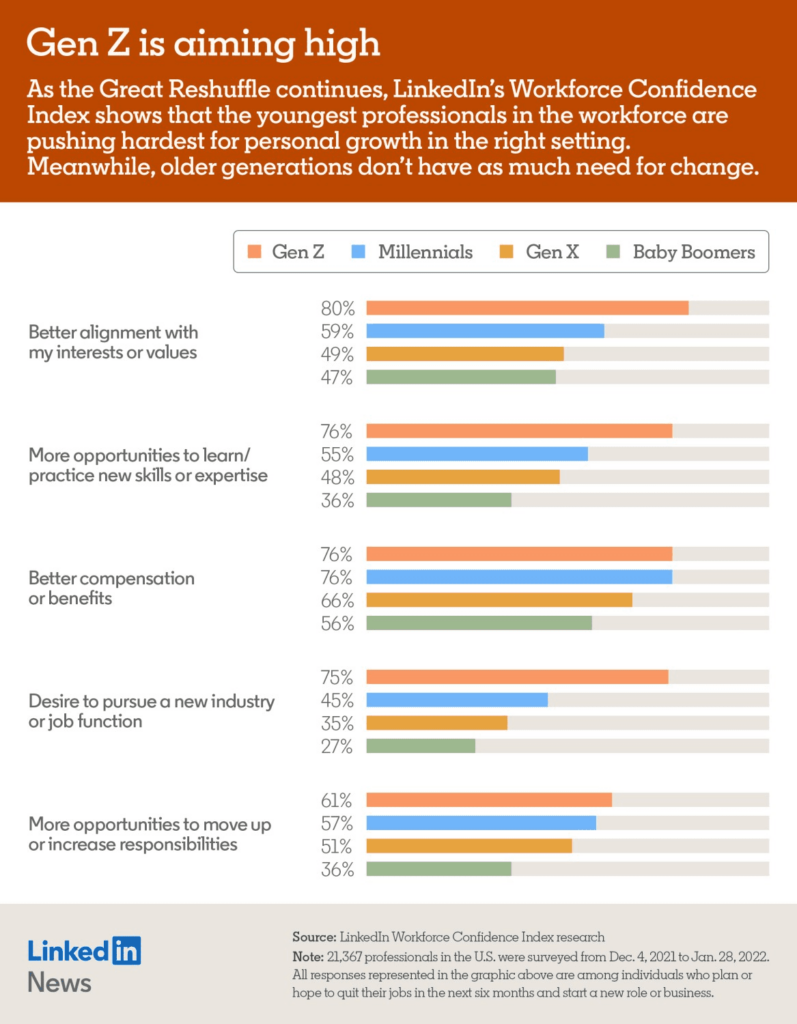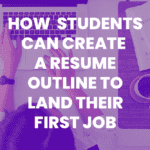Table of Contents
Does job-hopping make you appear unreliable? Or does staying at the same job for years and years limit your opportunities?
The answers to these questions depend largely on who you ask. People over the age of 40 may very well argue for staying in the same job. People in younger generations may advocate for changing jobs more frequently.
Studies have shown this to be true.
A 2022 LinkedIn survey of more than 280,000 people found that 25% of Gen Z workers and 23% of Millennials surveyed said they plan to leave their job within six months. When asked the same question, only 18% of Gen Xers and a mere 12% of Baby Boomers said the same.
There are a bunch of reasons that could explain this gap in perspective: different economic scenarios, changes in technology (hello, internet), differing attitudes about mental health and Capitalism, a global pandemic… just to name a few.
Stats and trends unfortunately can’t help you decide if you should become a job hopper or a company lifer. That depends on your personality, the job you have, and the career you want.
If you’re struggling to decide which is better for your career, here are four questions to ask yourself.
1. What are your career goals?
Let’s start with the hardest question first: What do you want your career path to be?
This question isn’t easy to answer, especially if you’ve only recently graduated or are about to graduate from school, and you’re taking the first step on your career journey.
It’s perfectly fine to change your career goals later in life—people do it all the time. You may even choose to return to school at some point. Or perhaps the job of your dreams doesn’t even exist yet.
But you’ll have a much easier time choosing whether to stay at your job or move on and hop around if you have at least a general sketch of where you want to be five or ten years from now.
Instead of focusing on a particular job title or work experience you want, think more generally:
- Do you want to live in an urban, suburban, or rural environment?
- What salary would you need to feel comfortable?
- How do you feel about commuting to a job?
- Do you prefer working with others or on your own?
- Do you enjoy large office settings or more intimate small teams?
Questions like these can help you envision your ideal life and reverse-engineer your career path to meet these goals.
For example, if you know you’re interested in visual arts, and you like the idea of living in a bustling city and working in a large group, a job as a graphic designer might give you the career path you want.
If you prefer, however, working outside with nature and enjoying your alone time, you might be looking at a career as a conservationist at a national park or a scientist working in a lab in Greenland.
The type of job and lifestyle you want will greatly impact whether you should be job hopping or staying put.
2. How happy are you at your current job?
Over the last few years, we’ve seen a big shift in how people value their mental health and work-life balance.
In that same LinkedIn study mentioned earlier, members of Gen Z said the most common reason they’d change jobs was to find “better alignment with their interests or values.” This is opposed to Baby Boomers, who cited “better compensation or benefits” as their top reason.

If you routinely find yourself dreading coming into the office, or if you’re dealing with a toxic boss or workplace, it may not be worth staying at your job, even if you think it could lead to the career of your dreams. Putting your mental health on the backburner means you won’t ever reach that job because you’ll burn out far before you get there.
However, just because you aren’t 100% happy with your job doesn’t mean it’s time to move on right away. You must consider whether the issues at work are something you can address or endure in order to advance within the same company you’re in now.
On the flip side, just because you’re happy with your job now doesn’t mean you should stay there forever. Sometimes, you need to move on from a job to reach the next step in your career, even if it’s a great job. This brings us to the next question to ask…
3. How much room for growth is there at your company?
No matter what your style of working is, it’s important to see your current job as a stepping stone to bring you closer to the working experience you want in life.
If you plan to stay in the same job for more than a year or two, it’s important to have ample opportunities to advance your career from within the company.
Here are some questions to ask:
- Does your manager talk openly about opportunities for advancement?
- Have you seen other people take steps forward at this company?
- Is the company itself growing and advancing?
- Does the job give you opportunities to learn new skills?
Advancement doesn’t necessarily have to mean a promotion (though it often does). But you must be certain that you have the chance to learn and grow, or else it may be time to hop to a new job.
If there are opportunities to grow at your current job, how do those opportunities align with other companies also in your industry? Take a look on LinkedIn and see what other companies are hiring, what job titles are available, and what salary rates are.
Even if your company does give you the chance to grow, you may still be able to grow faster somewhere else. If not, you can stay at your current job knowing you’re in the best place for your long-term goals.
4. How confident are you that you’ll find a new job?
There are some external factors to consider when trying to decide whether you should try out job hopping.
Don’t make any decisions about leaving or staying at your job until you’ve thoroughly researched the current economy. A job shortage will make it significantly riskier to look for a new job. Other times, as we saw in 2021, it’s a worker’s market—when jobs are plentiful, and employers have to add more perks and benefits to fill roles.
You’ll need to consider the job market for your particular industry, as well as the particular area where you live (unless your job is entirely remote). One good place to start researching is the US Bureau of Labour Statistics website, which regularly updates its job reports based on industry and location.
You can also do a temperature check by looking at current job openings on LinkedIn or major job boards. See how many roles are available that would suit you and what benefits/pay rate they are offering. This will tell you whether it’s a good idea to jump ship and find a new job now or hold tight until the market improves.
Thinking about job hopping? Here are a few tips
If you reflected on the questions above and have decided that job hopping is more your speed, here are a few tips to make the most of it and advance your career as you go:
Beef up your interview skills
One of the downsides of job hopping is that you’ll be in the hot seat a lot more often. (Unless you’re one of those people who enjoys going to job interviews.)
So, if you’re planning on job hopping, now’s the time to start improving your interview skills. Here are a few articles that will help you out:
Build consistency and credibility on the side
There’s an inherent risk that comes with job hopping. Future employers may see the short job lengths on your resume as a sign of inconsistency or unreliability.
You can counter this by developing something long-term on the side. This could be a side hustle that supports your ultimate career goals or a community activity that aligns with the skills you need in your career.
For example, perhaps you ultimately want to work as a social media manager, but you find yourself hopping jobs frequently for whatever reason. Consider starting a few social media channels in your free time about whatever interests you. Grow your following, get creative, and keep it consistent. Then, when a hiring manager is wondering about your ability to commit to a job, you have something to point to—something you’ve nurtured and grown yourself over a long period of time.
Tailor your resume for every job you apply to
In most cases, listing a number of short-term jobs on your resume isn’t a good look. Instead of listing every job you’ve ever had on your CV, try creating a few different resumes depending on the jobs you’re applying for.
You can keep many parts of the resume the same. You should choose the most relevant three or four jobs to list in the work experience portion and leave out less relevant jobs. Create a few different versions of your resume with different jobs and save them, so you don’t have to create a new resume every time you want to apply.
If you want more tips for how to make an impressive resume and LinkedIn profile, check out these articles:
Should you stay or should you go? The choice is yours
Which is better for your career, job hopping or staying at the same job long term? There’s no definitive answer to this question—it all depends on your personal circumstances and aspirations.
Be thoughtful about your career path, take your happiness into account, and look at the big picture. By balancing these things together, you’ll be able to decide whether you should stay put or job hop.











